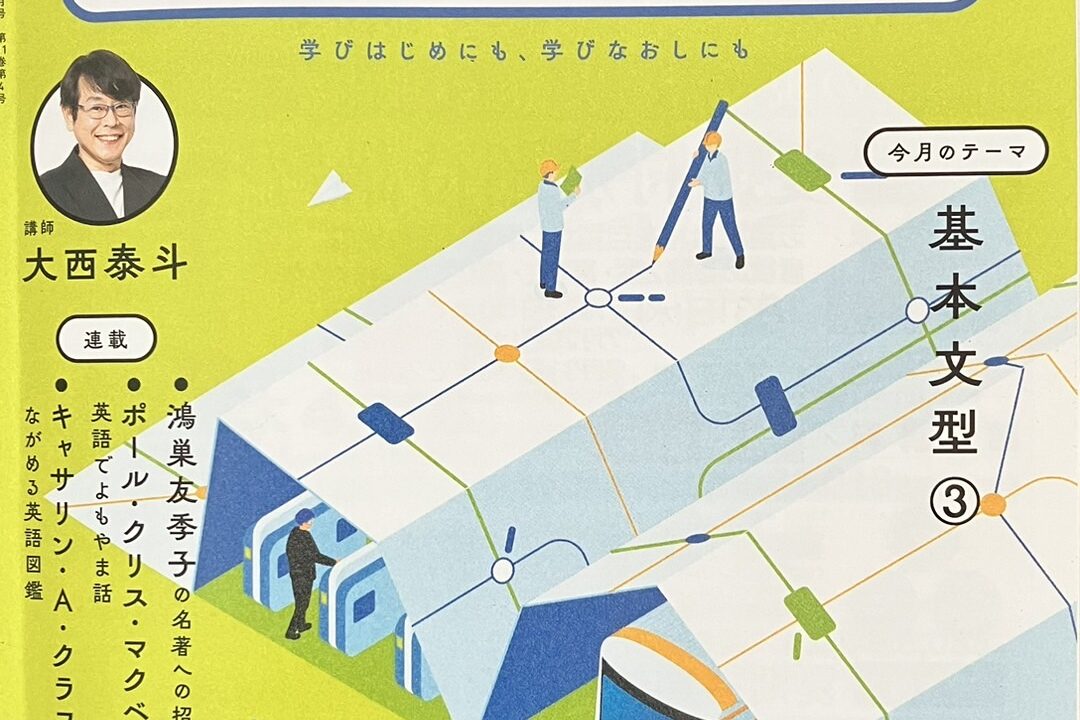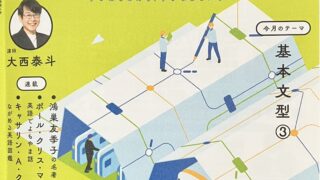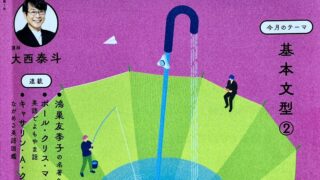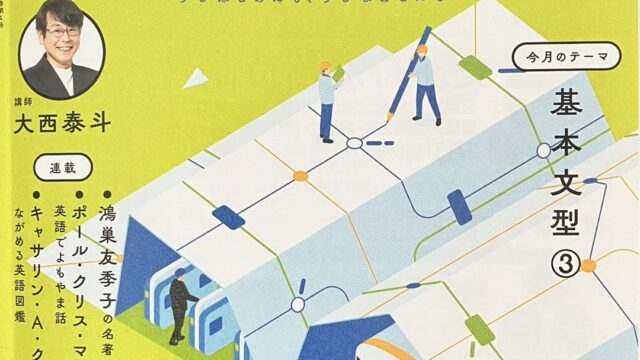【ラジオ英会話】Lesson 66 リポート文 – if / whether節 – July 8 Monday, 2024

July 8 Monday, 2024
Lesson 66 リポート文 – if / whether節
☆Words & Phrases
**unusual:
Well, they found something unusual inside it.
**appear to be ~:
**advanced:
**electronic device:
It appears to be some kind of advanced electronic device.
**bury:
**back then:
The time capsule was buried in 1865. There were no such electronic devices back then.
**highly:
**unlikely:
That’s highly unlikely.
**have ~ on one’s hands:
Then we have a mystery on our hands.
☆Grammar and Vocabulary
Did you hear about the time capsule they discovered in Oxford?
関係代名詞節修飾
この文の the time capsule they discovered in Oxford では関係代名詞節修飾が行われている。この修飾は「組み合わせ」修飾。先行詞(修飾される名詞)と後続節内の空所 ( ) が組み合わされることによって修飾関係が作られる
この文の関係代名詞節、they discovered in Oxford(彼らはオックスフォードで ( ) を発見しました)には、discovered の目的語位置に空所 ( ) がある。この空所と先行詞 the time capsule が組み合わされ「彼らがオックスフォードで発見した – タイムカプセル」という修飾関係となっている
They found something unusual inside it.
-thing/-one/-bodyで終わる名詞の修飾
something の後ろにそれを修飾する unusual が置かれている
-thing/-one/-body で終わる名詞はこのようにしばしば後ろに修飾語が置かれるが、それはこうした単語の意味が漠然としているため
something(何か)だけでは、どんな「何か」なのか分からない。そこで、その説明が後ろに置かれることになる
「説明ルール: 説明は後ろに置く」が作り出す形のひとつ

☆Target Forms
I wonder if someone put it in there later.
「リポート文」は、動詞(句)の内容を後続の節が説明・展開する形。この形で使われる節は Lesson64 の that節だけでなく、if/whether節(~かどうか)を使うこともできる

この文の wonder は頭に大きな「クエスチョンマーク(?)」が浮かんでいることを表す動詞
それを if 以下の節が説明し「~かどうかと思う=~ということなのかな」となる
Practice
皆さんはこれまでのレッスンで if/whether節に出合っていますね。6月号 Lesson 43で、説明型の説明語句として登場しました。今回は動詞(句)の後ろに置いて、その説明とするだけですよ。
I wonder
↓
I wonder if someone put it in there later.

① I’m curious whether he remembers me.
→ am curious を whether節で展開
② I don’t care if you’re bored.
→ don’t care は「かまわない・気にしない」
③ Do you know if that’s true?
→ know の内容を if節で展開で、よく使われるフレーズ
★Practice
D: All right, today’s target forms are again「リポート文」but, we’ll use if-whether clauses. Just like last time, we’ll use the main verb then use the if/whether clause to explain it after. Let’s practice and put it in your pocket.
R: Repeat after us,
– I’m curious, I’m curious
– I’m curious whether he remembers me.
D: Great! Let’s keep going,
– I don’t care, I don’t care
– I don’t care if you’re bored.
R: Okay, one more,
– Do you know, Do you know
– Do you know if that’s true?
D: Unlock your potential.
R: Repetition is the key!
D&R: Great work.
☆Grammar in Action
①私は、彼が私を理解しているのかどうか興味があります。英語は彼の母語ではありませんから
**native language:
②私は、あなたが正しいのかどうかわかりません。私はこのトピックに関しては専門家ではないのです
**expert:
③ジェニファーがこれを書いたのでしょうか。これは彼女の筆跡のように見えます
**handwriting:
★Ending
O: Hey. Have you ever seen my handwriting?
D: Oh yeah. It’s very fancy, ah, it’s very nice, I can’t read it at all, but it looks good.
July 8 Monday, 2024
Lesson 66 リポート文 – if / whether節
(日本語訳・解説付き)
☆Words & Phrases
**unusual: 普通でない、異常な、まれな
Well, they found something unusual inside it.
実は、その中から変わったものが見つかったんです
**appear to be ~: ~であるように見える
**advanced: 進んだ、進歩した、進化した
**electronic device: 電子機器
It appears to be some kind of advanced electronic device.
ある種の高度な電子機器のように見えるものです
**bury:(土中に~を)埋める、埋蔵する
**back then: その当時、そのとき、あのとき
The time capsule was buried in 1865. There were no such electronic devices back then.
そのタイムカプセルは1865年に埋められたんです。当時は、そんな電子機器なんてありませんでした
**highly:(程度などが)非常に、高度に
**unlikely: ありそうもない ※形容詞
That’s highly unlikely.
それは、ほぼありえません
**have ~ on one’s hands: ~が手元に残されている
Then we have a mystery on our hands.
そうだとすれば、私たちには謎が残されたことになりますね
☆Grammar and Vocabulary
Did you hear about the time capsule they discovered in Oxford?
あなたは、彼らがオックスフォードで発見したタイムカプセルについて聞きましたか?
関係代名詞節修飾
この文の the time capsule they discovered in Oxford では関係代名詞節修飾が行われている。この修飾は「組み合わせ」修飾。先行詞(修飾される名詞)と後続節内の空所 ( ) が組み合わされることによって修飾関係が作られる
この文の関係代名詞節、they discovered in Oxford(彼らはオックスフォードで ( ) を発見しました)には、discovered の目的語位置に空所 ( ) がある。この空所と先行詞 the time capsule が組み合わされ「彼らがオックスフォードで発見した – タイムカプセル」という修飾関係となっている
They found something unusual inside it.
彼らはその中に何か普通でないものを見つけました。
-thing/-one/-bodyで終わる名詞の修飾
something の後ろにそれを修飾する unusual が置かれている
-thing/-one/-body で終わる名詞はこのようにしばしば後ろに修飾語が置かれるが、それはこうした単語の意味が漠然としているため
something(何か)だけでは、どんな「何か」なのか分からない。そこで、その説明が後ろに置かれることになる
「説明ルール: 説明は後ろに置く」が作り出す形のひとつ

☆Target Forms
I wonder if someone put it in there later.
誰かがあとで、そこにそれを入れたのではないでしょうか
「リポート文」は、動詞(句)の内容を後続の節が説明・展開する形。この形で使われる節は Lesson64 の that節だけでなく、if/whether節(~かどうか)を使うこともできる

この文の wonder は頭に大きな「クエスチョンマーク(?)」が浮かんでいることを表す動詞
それを if 以下の節が説明し「~かどうかと思う=~ということなのかな」となる
Practice
皆さんはこれまでのレッスンで if/whether節に出合っていますね。6月号 Lesson 43で、説明型の説明語句として登場しました。今回は動詞(句)の後ろに置いて、その説明とするだけですよ。
I wonder
↓
I wonder if someone put it in there later.

① I’m curious whether he remembers me.
私は、彼が私を覚えているかどうかが知りたいです
→ am curious を whether節で展開
② I don’t care if you’re bored.
私は、あなたが飽きているかどうかは気にしません
→ don’t care は「かまわない・気にしない」
③ Do you know if that’s true?
それが本当かどうかご存じでしょうか?
→ know の内容を if節で展開で、よく使われるフレーズ
★Practice
D: All right, today’s target forms are again「リポート文」but, we’ll use if-whether clauses. Just like last time, we’ll use the main verb then use the if/whether clause to explain it after. Let’s practice and put it in your pocket.
R: Repeat after us,
– I’m curious, I’m curious
– I’m curious whether he remembers me.
D: Great! Let’s keep going,
– I don’t care, I don’t care
– I don’t care if you’re bored.
R: Okay, one more,
– Do you know, Do you know
– Do you know if that’s true?
D: Unlock your potential.
R: Repetition is the key!
D&R: Great work.
☆Grammar in Action
①私は、彼が私を理解しているのかどうか興味があります。英語は彼の母語ではありませんから
I’m curious whether he understands me or not. English isn’t his native language.
**native language: 母語
②私は、あなたが正しいのかどうかわかりません。私はこのトピックに関しては専門家ではないのです
I’m not sure whether or not you’re right. I’m not an expert on the topic.
**expert: 専門家
③ジェニファーがこれを書いたのでしょうか。これは彼女の筆跡のように見えます
I wonder if Jennifer wrote this. This looks like her handwriting.
**handwriting: 筆跡
★Ending
O: Hey. Have you ever seen my handwriting?
D: Oh yeah. It’s very fancy, ah, it’s very nice, I can’t read it at all, but it looks good.
名古屋駅前にあるビジネス英語&仕事での英語雑談力をつけるための「名古屋BEGビジネス英会話ジム」
営業時間:平日 9:00~22:00 土曜日 9:00~19:00(日祝休み)
〒450-0002 愛知県名古屋市中村区名駅2丁目40-16 名駅野村ビル 5階

